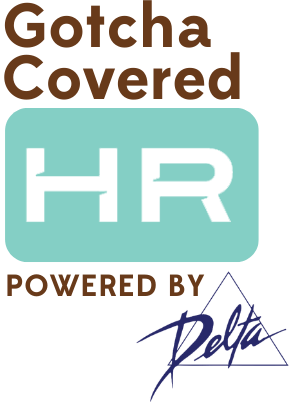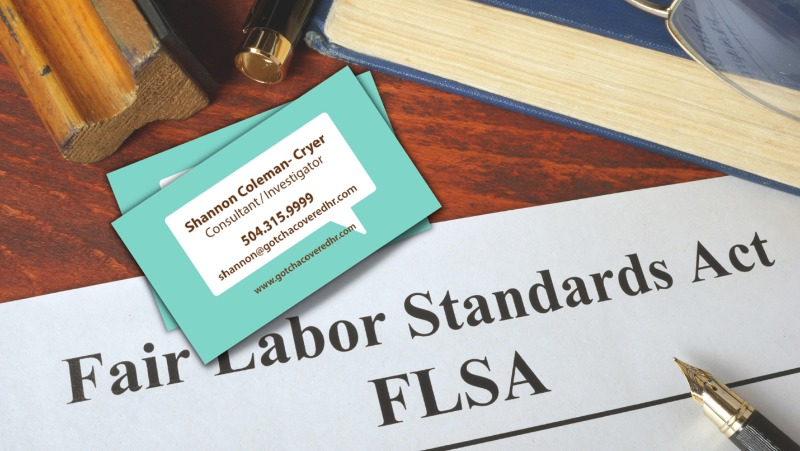Hi everyone, Shannon here, from Gotcha Covered HR, the one-stop-shop for all your HR needs! Today I’d like to discuss “All you need to know about record-keeping” as it relates to the requirements of the U.S Department of Labor’s Wage and Hour Division — the governmental agency charged with enforcing the Fair Labor Standards Act (FLSA).
Understanding the record-keeping requirements of FLSA and the enforcement procedures of the Wage and Hour Division (WHD) can be confusing, especially for the small business owner. As a starting point before we hop on to the logistics of record-keeping, let’s discuss whether the WHD may have jurisdiction over your particular business.
Any business that earns $500,000 or more per year and has two or more employees is considered a “covered employer” under the FLSA. However, even if your business does not meet the $500,000 threshold, if your employees are engaged in work that “regularly involves them in commerce between States” (i.e., interstate commerce), then your business is also covered.
Determining whether your employees are “engaged in interstate commerce” could be as simple as employing anyone who swipes credit cards – this would include, for example, a restaurant’s servers and cashiers. Because credit cards typically process across state lines or even in other countries, WHD considers this to be interstate commerce. Another example is an employee who travels out of state for business, or an office worker who uses a telephone, fax machine, the U.S. mail, or e-mail to communicate with people in another state. All of these workers are considered to be engaged in interstate commerce.
Thus, even if your business does not make $500,000 per year, if your employees are engaged in interstate commerce then the WHD can claim jurisdiction over your business and proceed with an investigation to ensure compliance with recordkeeping as well as minimum wage and overtime requirements. That means that this article, dear “covered employer,” is meant for you! It is your responsibility to ensure proper record-keeping under the provisions of the FLSA, and Shannon is here to help you figure it out.
As a former WHD Investigator, a violation I have seen time and time again is employers failing to keep proper records of labor time sheets – in some cases, employers actually discarded time sheets after the pay period ended. If you are one of those employers, please stop this practice immediately! WHD regulations (29 CFR 516.6) require that basic employment and earnings records must be kept for two years from the date of last entry. These records, which should be kept at hand and on premises, include timesheets that reflect the workweek, the number of hours worked, and the daily start and stop time for each employee.
In addition to timesheets, there are other requirements for which employers are responsible. Businesses must also keep records of employee names, complete home addresses, date of birth (for employees under the age of 19), sex, occupation, position held, and date of hire. Again, these records must be kept for a minimum period of two years.
Records that must be preserved for a period of three years include payroll records and certain collective bargaining agreements.
In my years as an Investigator, I cited violations for these easily preventable situations too many times. While record-keeping violations are non-monetary, businesses gain a negative history with WHD, which may lead to subsequent investigations of violations that do carry monetary penalties, such as violations of minimum wage or overtime. These types of violations may also result in liquidated damages (which double the monetary penalties) as well as additional civil money penalties — all of which can add up to huge sums of money which can cripple a small business operation.
Another often overlooked requirement is the proper posting of FLSA notices.
This is yet another area in which I frequently found employers to be in violation. FLSA posters must be visible in common areas where employees congregate daily and must be translated into all languages spoken by employees. Free FLSA posters can be downloaded here. If your business does not have these, I advise you to get them immediately, as this is one of the first things WHD Investigators look for when entering an establishment.
Complying with all the record-keeping requirements of WHD can be arduous. Be sure to protect yourself and your business by being prepared for a WHD visit. Gotcha Covered HR can help ensure that your business is compliant with FLSA standards and record-keeping practices. If you have any questions about whether your business is compliant with the FLSA, and especially if you are currently under investigation, do not hesitate to contact me at (504) 315-9999 or Shannon@GotchaCoveredHR.com.
Shannon-Coleman Cryer is a Wage and Hour Compliance Advisor for, Gotcha Covered HR with over eight years of experience as a Federal Investigator for the U.S. Department of Labor’s Wage and Hour Division.








